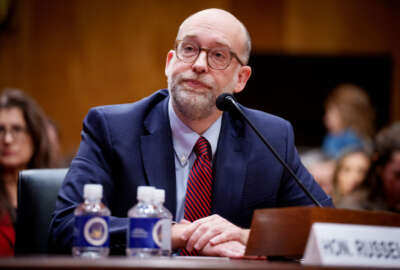NTEU seeks CBP officer hiring surge to offset looming retirement wave
The National Treasury Employees Union says CBP’s staffing model shows it’s already short 5,850 officers, even before the retirement wave hits.
Customs and Border Protection is anticipating a retirement surge among its employees who secure U.S. ports of entry.
The agency’s leadership plans to increase hiring for CBP officers in the coming years, to offset projections that the number of retirements may spike in 2028.
The agency currently employs about 28,500 CBP officers to secure more than 328 ports of entry across the U.S. and 15 preclearance ports outside the country.
The National Treasury Employees Union says CBP’s staffing model shows it’s already short 5,850 officers, even before the retirement wave hits. The union is calling on lawmakers to give CBP enough funding over the next three years to replace retiring officers.
“Right now, what they’ve been funded for is not the number that they need,” NTEU National President Doreen Greenwald told Federal News Network in an interview.
CBP Commissioner Troy Miller told the House Homeland Security Appropriations Subcommittee on April 30 that the agency is looking at a 400% increase in officer retirements in 2028.
“We need to focus on hiring,” Miller said. “We need to have a plan where we start hiring in advance of 2028, and in fact over-hire in ’26 and ’27, so we don’t have a 400% [increase in] the attrition rate when 2028 hits us.”
CBP expects that at least 2,220 officers are expected to retire in 2028, which is well above its annual average of about 500 retirements.
NTEU warns that inadequate hiring ahead of this retirement wave would require excessive overtime for remaining employees, and create a “catastrophic breakdown in port operations,” if thousands of CBP officers retire without anyone to replace them.
“It’s up to Congress to make sure CBP has the resources to back-fill those jobs immediately,” Greenwald said in a press release. “If not, wait times at border crossings go up and there are fewer trained professionals to inspect suspicious cars, trucks, container ships and international packages.”
NTEU represents employees at CBP’s Office of Field Operations and the Federal Law Enforcement Training Center (FLETC). The union is also calling on Congress to increase funding for FLETC to train new CBP officers.
“It takes a period of time for them to go through training with and get them up and running,” Greenwald said. “If you don’t have enough resources at FLETC to train new hires, it slows down that process to getting them actually on the job.”
The surge in retirements is expected when about 20% of all CBP officers will no longer accrue additional law enforcement retirement benefits because they were hired prior to July 8, 2008, when CBP officers were granted law enforcement officer status.
The Department of Homeland Security says it seized over 27,000 pounds of fentanyl so far this year. More than 90% of seized fentanyl is stopped at ports of entry.
The House-passed FY 2025 Homeland Security appropriations bill includes funding for CBP to hire an additional 150 CBP officers.
President Joe Biden proposed funding to hire 1,000 new CBP officers in an October 2023 emergency supplemental funding request, the administration’s FY 2025 budget request and a border control bill that failed to secure enough Republican votes to pass in Congress.
Miller told lawmakers that CBP also anticipates a “retirement surge” among Border Patrol agents.
“We have a large amount of folks retiring,” Miller said. “We expect, in the next five years, we’re going to start to see more and more folks retire.”
Miller said Border Patrol doubled its staffing from 10,000 employees in 2002 to 20,000 employees in 2011, and that a significant number of employees are nearing retirement age.
Unlike CBP officers, however, Border Patrol is well-funded to increase staffing. The fiscal 2024 spending deal gave CBP nearly $500 million to hire enough Border Patrol agents to maintain a workforce of 22,000, a record high for the agency.
Federal News Network’s Justin Doubleday contributed reporting.
Copyright © 2025 Federal News Network. All rights reserved. This website is not intended for users located within the European Economic Area.
Jory Heckman is a reporter at Federal News Network covering U.S. Postal Service, IRS, big data and technology issues.
Follow @jheckmanWFED






